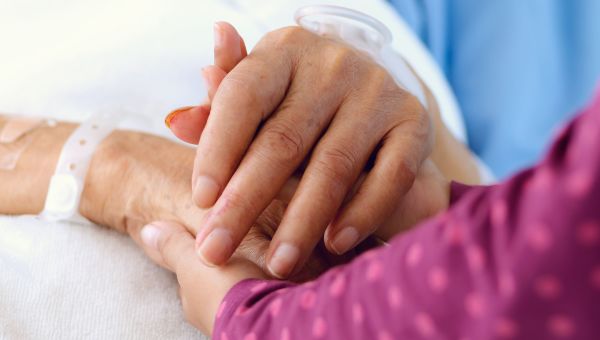6 things your doctor wishes you knew about death
Why do some people wake up? Will it hurt? And other questions that have crossed your mind.
Updated on April 22, 2024

Each death is as unique as the life it completes. No one can tell you when you’ll go, or exactly how it will feel. But like any major life event, it can be a meaningful experience. If you’re not afraid to ask about death, and you make your wishes known, it can:
- Be a reflection of how you lived
- Take place after you’ve spoken to or seen loved ones
- Be as comfortable as possible
- Encourage a healthy grieving process among family and friends
With that in mind, here are essential facts everyone should know about death.

The signs death is near
“When someone’s actively dying, there are two processes happening,” says Upinder Singh, MD, an internal medicine doctor specializing in geriatrics in Las Vegas. “One is physical and the other is emotional and psychological.”
On the physical side, the person’s organs are shutting down. They might experience:
- Cold or bluish hands and feet as circulation slows
- A loss of control over bowel and bladder functions
- Decreased urine as less blood reaches the kidneys
- Loss of hunger and thirst
- Changes in breathing patterns (may be fast, slow or irregular)
- Continued hearing abilities—this is usually the last sense to go, so keep saying nice things
Emotionally, there are many factors at play, but often the person is trying to figure out whether they’ve accomplished everything, or not, says Dr. Singh. They could have a range of cognitive symptoms, from confusion, to agitation, to hallucinations and others. They might sleep for long periods and, when they wake up, think they’re somewhere else.
They’re trying to make sense of their life while their body’s shutting down—organ failure, meds and emotions can all affect how the brain works in a person’s last hours.

Why some people wake up after dying
We’ve all heard stories of people dying in the emergency room and then, incredibly, coming back to life. How is that possible? For one thing, just because the heart stops, doesn’t necessarily mean it’s damaged beyond repair. And, even though the heart’s not pumping, the brain might have enough blood and oxygen to stay alive for a short time.
If someone can immediately receive CPR (cardiopulmonary resuscitation) and defibrillation—electric shocks to the heart—there’s a chance their heart could start pumping again before their organs fail. Many people need a breathing tube also, which keeps oxygen flowing into their lungs (intubation). Even with these treatments, though, most people don’t come back.
Sometimes, a person’s body is revived, but if their brain was starved of oxygen for too long, they don’t wake up. In that case, they’ll undergo a test called an electroencephalogram (EEG). An EEG shows electrical activity in the brain and, if it indicates brain death, life support is typically stopped.

Death doesn't have to be painful
“Every death is unique,” says Singh. “But in general, death doesn’t have to be painful.” Whether you die at home, in a hospital or in a nursing facility, a palliative care specialist can help you stay comfortable.
“Palliation means relief from symptoms,” Singh explains. “So every type of care should incorporate palliative care.” It doesn’t matter if your doctors believe you have years to live, or just a couple of days; a palliative care specialist can help:
- Make sure your wishes regarding when to stop aggressive treatments like intubation are honored
- Ease pain
- Relieve shortness of breath
- Treat nausea and constipation
- Come up with solutions for eating and appetite problems
- Address sleep troubles or exhaustion
This type of care is different from hospice, which means someone is no longer accepting aggressive treatments. Hospice care is typically started in the last six months of life; palliative care can begin at any point during an illness. If you or someone you know might benefit from palliative care, learn more at Getpalliativecare.org.

It's possible to plan a peaceful death
“The best time to plan for your death is when you’re healthy and relaxed—not when you're going through a huge medical crisis,” says Singh. “That means today, now. Make plans in the doctor's office and at home, not in the intensive care unit.”
It’s never too early to express your wishes regarding:
- End of life care
- How much treatment you’d like, and under which specific circumstances
- Who should make medical decisions for you, if you’re unable to
- Who should make financial decisions on your behalf
- How you’d like to be honored after your death
- The division of your belongings among people you care about
"The difference between dying at home and dying in the hospital, between spending time hooked up to machines or going naturally, can be humongous," explains Singh. “Studies show that 80 percent of Americans want to die at home, but 80 percent actually die in an institution like a hospital or nursing home.”
Express your wishes to loved ones, your healthcare providers and in writing to help ensure you die peacefully. Visit Five Wishes, a website that offers simple advance directive forms that can be mailed to you or filled out online. These forms can include your medical, legal, personal, and spiritual plans regarding death.

How to support a loved one who's dying
Since you don’t know exactly what your loved one’s seeing or feeling, their actions can seem alarming. Confusion is common with death, but if you’re worried, check with their nurse or doctor to make sure they’re being kept comfortable. Remember, you don’t need to convince the person of reality. Don’t argue with them about where they are, for example. But do tell them you’re by their side and you love them.
Here are some things you can do to comfort them:
- Request chaplain services if they’d want prayers or spiritual support (most hospitals and hospices offer).
- Help arrange transportation for anyone they’d want to see before passing.
- Play their favorite music at a soft volume.
- Hold their hand.
- Ask the nurse to show you how to keep their mouth moist and clean. You may be able to use chap stick and moist sponges help prevent uncomfortable drying.
“Just being there, sometimes, is all they need,” says Singh. “Everyone’s different, but some people are afraid of being alone at the time of death. So knowing you’re in the room can be a big deal to them.”

Don’t let questions go unasked
“We are a death denying culture,” says Singh. “And that is a sad thing. We are all going to die one day, and we work so hard to have a good life, don’t we deserve a good death, too? Even if your doctor doesn’t ask you at your next appointment, bring it up. Say, ‘We need to talk about this today, doc.'”
The questions each of us has about death will vary, he continues. But these inner fears or questions you have on your mind, they don’t just affect you. “Knowledge is power, and it can help you take the right actions. Asking your questions and planning in advance can keep you comfortable and ensure your family has a healthy grieving process.”

Northwestern Medicine. Last Hours of Living. Accessed July 28, 2017.
Hospice Foundation of America. Signs of Approaching Death. Accessed April 22, 2024.
Hospice Foundation of America. Helping a Friend Who Is Dying. Accessed April 22, 2024.
NIH/National Institute on Aging. Providing Care and Comfort at the End of Life. Reviewed November 17, 2022.
Mayo Clinic. EEG (electroencephalogram). May 11, 2022.
Get Palliative Care. What is Palliative Care? Accessed April 22, 2024.
NIH/National Institute on Aging. What Are Palliative Care and Hospice Care? Reviewed May 14, 2021.
MedlinePlus. Palliative Care. Updated March 26, 2015.
FiveWishes.org. Five Wishes. Accessed April 22, 2024.
Centers for Disease Control and Prevention. Advance Care Planning: Ensuring Your Wishes Are Known and Honored If You Are Unable to Speak for Yourself. 2012.
More On


video

article

slideshow


video


video
